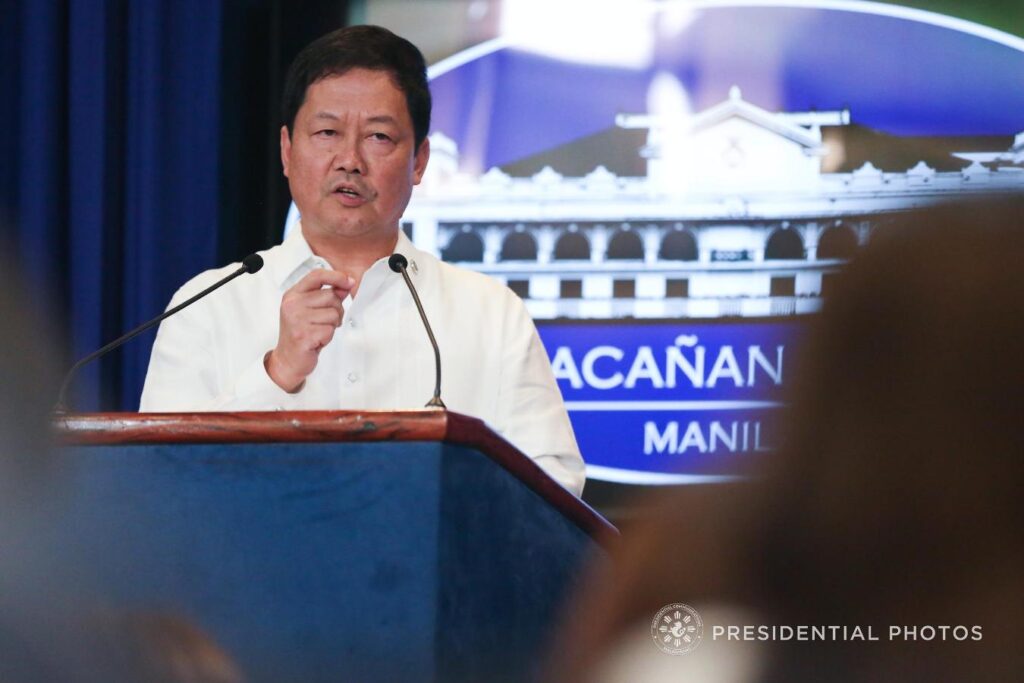News
PRRD may compel gov’t workers to get vaccinated: DOJ chief

MANILA – Justice Secretary Menardo Guevarra said President Rodrigo Roa Duterte may exercise control and supervision over the executive branch to issue an administrative order that would require government workers to get vaccinated against Covid-19.
This, after Duterte in his Talk to the People on Monday night, said he can compel people to get their Covid-19 vaccine “under the police power of the state”.
“For theoretical discussion only, if the President imposes compulsory anti-covid vaccination in the executive branch by way of an administrative issuance, he is doing so precisely as a chief executive who exercises control and supervision over the executive branch, and not pursuant to police power,” Menardo said in a media interview on Wednesday.
Guevarra said it is within the President’s power to compel vaccination, but the police power of the state cannot extend to imposing penalties without a law authorizing it.
“The President correctly invoked police power as basis to compel anti-covid vaccination for everyone except those who have valid reasons. The power rests upon the inherent right of the state and the people to self-protection,” Guevarra said. “But this power, especially if accompanied by penalties or sanctions to enforce obedience or compliance, must be exercised through the legislature.”
In the absence of a law, “the executive branch may only use moral suasion, including the grant of incentives, to encourage widespread voluntary vaccination,” Guevarra said.
LGUs may pass own ordinance
In another media interview on Thursday, Guevarra said local government units (LGUs) may pass their own local ordinance to put teeth into Duterte’s push for mandatory vaccination to speed up the recovery from the impact of the pandemic.
“Theoretically, a local ordinance compelling all residents within the territory of the LGU to get themselves vaccinated against covid-19 may be enacted even without a national law on the matter,” Guevarra said.
He said local government units, through their legislative bodies, may also exercise police power.
“For example, a local ordinance prohibiting video game arcades within a certain distance from schools is an exercise of police power,” he said.
Guevarra, however, said like all other laws and ordinances invoking police power, “it may be challenged in court by anyone on the issue of reasonableness, among others.”
Malacañang said Congress would need to pass a law requiring Filipinos to get fully vaccinated against Covid-19.
“Basta po mayroon pong batas ay pupuwede po talaga ipatupad ‘yan so ilagay po natin sa konteksto. (As long as there is a law, we can implement that so let’s put it into the proper context),” he said in a Palace press briefing on Tuesday.
Asked to clarify if Duterte’s new pronouncement meant he was urging the legislative branch to pass a law compelling the public to get vaccinated, he responded in the affirmative.
“Yes, of course. That’s the jurisdiction of Congress but the President can always certify an administration bill for such a law,” Roque said.
Roque said several countries have turned to vaccine mandates to increase vaccination rates.
“Talaga pong mayroong kapangyarihan ang estado na gumamit ng police power para itaguyod ang ikabubuti ng karamihan. Pero pagdating po diyan sa bakuna, antayin po natin, dahil kinakailangan din natin ng polisiya. (The state really has the power to use police power to promote the good of the majority. But when it comes to the vaccine, let us wait, because we need a policy first),” he said.
Roque also reiterated Duterte’s statement asking government workers who refused to get vaccinated to leave public service.
“I guess sisimulan ni Presidente yung requirement na kinakailangan bakunado para magtrabaho po sa gobyerno. Pero (I guess the President will start requiring mandatory vaccination among those working in government. But) this is without prejudice po to Congress passing a law,” he said.
Duterte has approved the inoculation of the general population in October.





















